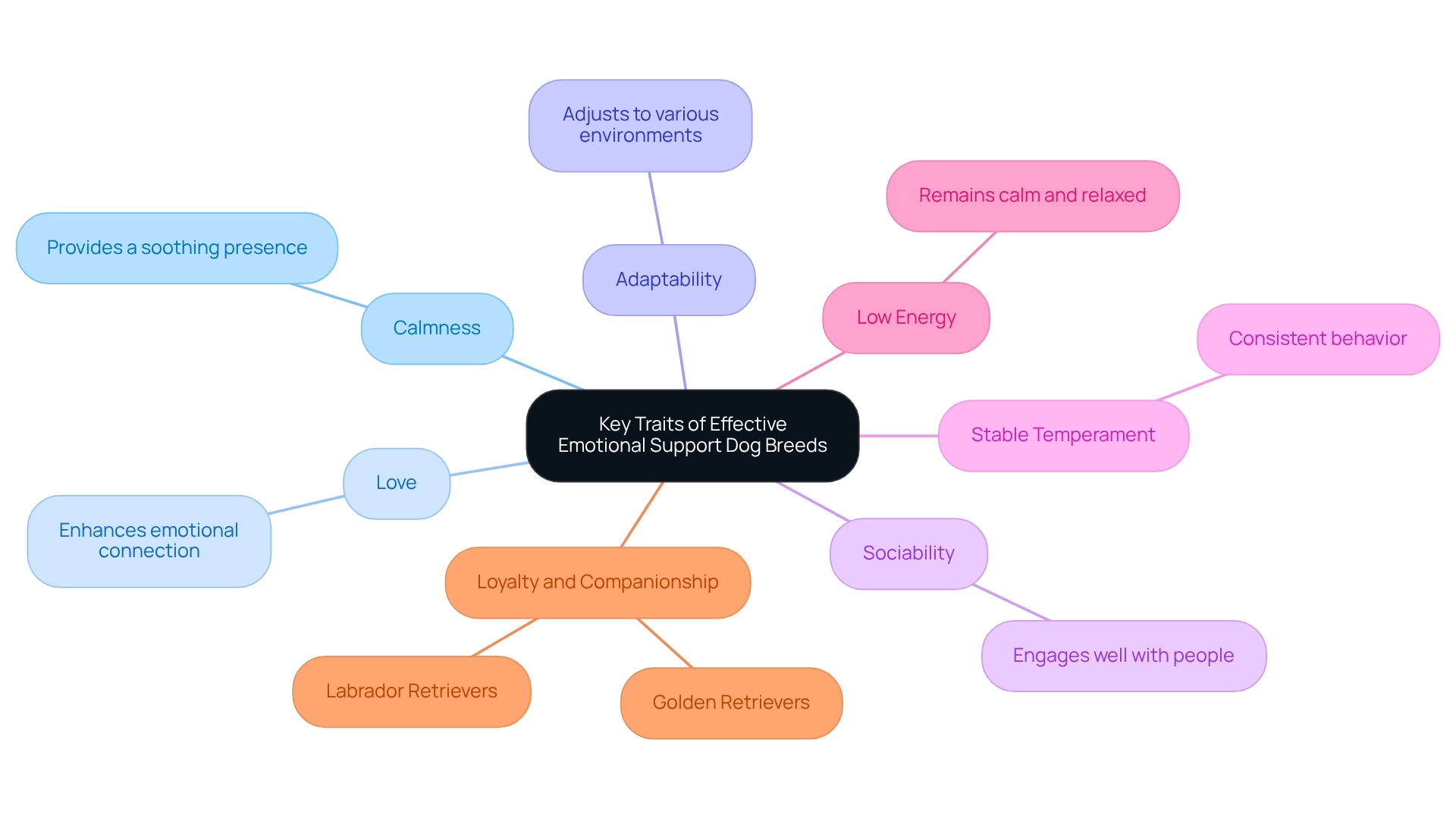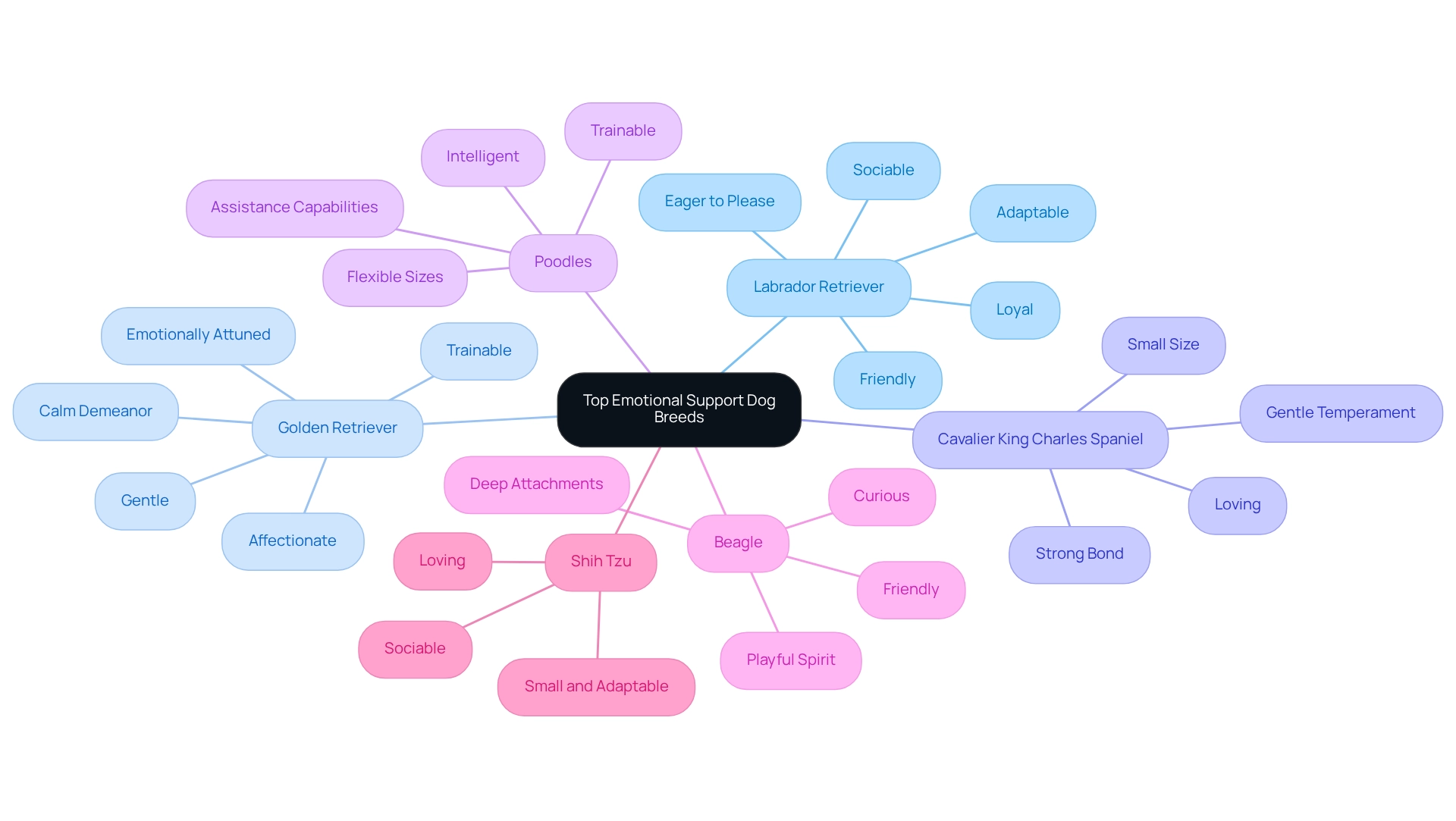

Best Emotional Support Dog Breeds: Key Traits and Comparisons
by Lena Park
Last updated: June 9, 2025
Verified and Approved by:
Angela Morris,
MSW, LCSW
Fact Checked

Overview
This article explores the most suitable breeds for emotional support dogs, focusing on essential traits such as calmness, sociability, and a unique ability to sense their owner’s emotions. It lovingly highlights that while breeds like Labrador Retrievers and Golden Retrievers are often cherished for their supportive qualities, it’s important to remember that any dog can become an emotional support animal. The key lies in the strong bond they develop with their owner, ultimately fostering emotional well-being and providing the comfort and companionship needed during challenging times.
Introduction
In a world where emotional well-being is increasingly recognized as vital to overall health, emotional support dogs (ESDs) emerge as invaluable companions for those grappling with psychological challenges. Many individuals face daily struggles with anxiety and depression, feeling isolated and overwhelmed by their emotions. Unlike service dogs, which undergo extensive training to perform specific tasks, ESDs offer comfort and companionship, playing a crucial role in alleviating these burdens. Their presence can provide a sense of security and calm, making a significant difference in the lives of those who need it most.
Understanding the unique traits of effective breeds, such as Labradors and Golden Retrievers, reveals the characteristics that make these animals exceptional emotional allies. These breeds are known for their gentle nature and ability to connect with people, fostering a bond that can help ease emotional distress. Furthermore, the journey to obtaining an emotional support animal letter and ensuring proper care is essential for maximizing the benefits these dogs provide. This letter serves as a supportive solution, validating the need for an ESD and allowing individuals to experience the comfort they offer.
As awareness grows, the significance of ESDs in enhancing quality of life becomes increasingly evident. They are not just pets; they are partners in emotional healing. If you or someone you know is navigating the complexities of mental health, exploring the option of an emotional support dog could be a transformative step toward a more fulfilling life. Remember, you are not alone in this journey, and support is available to help you find the companionship that can make a difference.
Understanding Emotional Support Dogs: Definition and Purpose
Comfort animals, often referred to as the best emotional support dog, provide solace and companionship to those navigating psychological challenges. Many individuals face overwhelming feelings of anxiety, depression, and other mental health concerns, and the presence of an ESD can be a gentle light in these dark times. Unlike assistance animals, which are specifically trained to perform tasks for individuals with disabilities, ESDs do not require specialized training. Their primary role is to offer psychological support, helping to alleviate emotional distress.
Common breeds chosen for their service work, such as:
- Labrador Retrievers
- Golden Retrievers
- German Shepherds
- Poodles
are often selected for their intelligence and temperament. However, it’s important to remember that any breed can serve as a comforting companion. The connection between a person and their ESD is what truly matters. While ESDs do not have the same legal rights and access to public spaces as service dogs under the ADA, their impact on quality of life can be profound.
Imagine coming home after a long day, feeling the weight of the world on your shoulders. The unconditional love and presence of an ESD can provide a sense of stability and comfort, making them an invaluable resource for those in need of psychological support. Have you ever felt the warmth of a pet curled up beside you, easing your worries? This simple act can significantly enhance emotional well-being.
For those grappling with mental health challenges, understanding the benefits of having the best emotional support dog can provide a source of hope. The companionship they offer can transform daily struggles into manageable moments of joy. If you’re considering the support of an ESD, know that there are compassionate solutions available, such as ESA letters, that can help facilitate this connection. You are not alone in your journey, and the support of an ESD can be a step towards healing.
Key Traits of Effective Emotional Support Dog Breeds
When it comes to choosing the best emotional support dog, several key traits stand out: calmness, love, and an innate ability to sense their owner’s feelings. A truly supportive companion animal, which can be the best emotional support dog, is not only adaptable and sociable but also possesses a stable temperament. Breeds renowned for their loyalty and companionship, like Golden Retrievers and Labrador Retrievers, are often considered the best emotional support dog in this nurturing role. Moreover, a lower energy level can be advantageous, allowing the dog to remain calm and relaxed in various settings, thus providing a soothing presence for their owners.
It’s essential to recognize that while many breeds can serve as comfort animals, they differ from service dogs, which are specifically trained to perform tasks for individuals with disabilities and have legal rights to access public spaces under the ADA. Understanding these distinctions can be incredibly helpful in selecting the right breed for companionship, ensuring that the emotional support you seek is met with the love and understanding that only a therapy dog can provide.
Have you ever felt the profound impact that a loving animal can have on your well-being? The right therapy dog, often considered the best emotional support dog, can truly transform your life by offering companionship that alleviates feelings of loneliness and anxiety. As you consider this journey, remember that support is available, and the bond you create with a therapy dog can be a source of comfort and joy.

Comparative Analysis of Top Emotional Support Dog Breeds
-
Labrador Retriever: Known for their friendly and sociable nature, Labradors are incredibly adaptable and make wonderful companions. Their loyalty and eagerness to please establish them as the best emotional support dog for those facing distressing moments.
-
Golden Retriever: Much like Labradors, Golden Retrievers exude gentleness and affection, and they are highly trainable. Their calm demeanor and ability to sense human emotions make them the best emotional support dog for individuals who need companionship.
-
Cavalier King Charles Spaniel: This breed is cherished for its loving disposition and strong bond with its owners. Their small size makes them well-suited for apartment living, and they are considered the best emotional support dog due to their gentle temperament, which provides perfect comfort for those seeking companionship.
-
Poodles: Renowned for their intelligence and trainability, Poodles are the best emotional support dog and incredibly beneficial as assistance animals. Available in various sizes, they offer flexibility for those looking for a companion that fits seamlessly into their lifestyle.
-
Beagle: Beagles are characterized by their friendly and curious nature, often forming deep attachments to their owners. Their playful spirit can help lift feelings of loneliness and depression, making them the best emotional support dog companions.
-
Shih Tzu: Celebrated for their loving and sociable nature, Shih Tzus are small and adaptable, making them excellent companions for individuals seeking comfort in cozy living spaces.

Navigating the Process: Obtaining ESA Letters and Ensuring Pet Care
Acquiring an assistance animal (ESA) letter is a significant step for individuals facing mental health challenges. It begins with a consultation with a licensed mental health expert who can assess the need for an assistance animal. This evaluation, though brief, is crucial in determining if the individual qualifies for an ESA based on their unique mental health condition. Once approved, the mental health professional will provide a legitimate ESA letter, serving as essential documentation for housing and travel. It’s important to ensure that this letter meets legal requirements to prevent any potential difficulties with landlords or airlines. Wellness Wag offers a compassionate online process through telehealth services, making it easier to obtain ESA letters efficiently.
Alongside the process of obtaining an ESA letter, pet care plays a vital role in the well-being of a comfort dog. Owners must ensure their dogs receive:
- Regular veterinary care
- Proper training
- Socialization
This commitment not only enhances the dog’s effectiveness as an emotional support animal but also fosters a safe and loving environment where the dog can thrive. In doing so, the dog fulfills its role as a companion and serves as the best emotional support dog, significantly contributing to the owner’s mental health and overall quality of life. Furthermore, emotional support animals are welcomed in university housing, creating equal opportunities for students with disabilities and enriching their educational experience.

Conclusion
Emotional support dogs (ESDs) serve as invaluable companions for individuals navigating emotional and psychological challenges. They offer comfort and stability, unlike service dogs, which require specialized training. Breeds such as Labradors, Golden Retrievers, and Cavalier King Charles Spaniels are often favored for their affectionate nature and ability to bond with their owners, making them ideal emotional allies.
Choosing the right breed involves understanding essential traits like calmness, sociability, and a stable temperament—qualities that are crucial for effective emotional support. It’s important to remember that while ESDs do not possess the same legal rights as service dogs, they still play a significant role in enhancing mental well-being.
To obtain an emotional support animal letter, individuals should consult a licensed mental health professional. This expert can assess the need for an ESD and provide the necessary documentation for housing and travel. Proper care, including regular veterinary visits and a nurturing environment, is vital for the dog’s well-being.
In essence, emotional support dogs are more than just pets; they are partners in emotional healing. Their presence can significantly alleviate feelings of anxiety and depression, offering companionship and reassurance. Exploring the option of an ESD can be a transformative step towards a more fulfilling life, reminding individuals that they are not alone on their journey to emotional wellness. Have you considered how an ESD could positively impact your life? The support they provide can be a beacon of hope during challenging times.
Frequently Asked Questions
What is the purpose of an Emotional Support Dog (ESD)?
The primary purpose of an Emotional Support Dog is to provide solace and companionship to individuals navigating psychological challenges, helping to alleviate emotional distress.
How do Emotional Support Dogs differ from assistance animals?
Unlike assistance animals, which are specifically trained to perform tasks for individuals with disabilities, Emotional Support Dogs do not require specialized training and primarily offer psychological support.
What breeds are commonly chosen as Emotional Support Dogs?
Common breeds selected for their temperament and intelligence include Labrador Retrievers, Golden Retrievers, German Shepherds, and Poodles. However, any breed can serve as a comforting companion.
Do Emotional Support Dogs have the same legal rights as service dogs?
No, Emotional Support Dogs do not have the same legal rights and access to public spaces as service dogs under the Americans with Disabilities Act (ADA).
How can an Emotional Support Dog impact a person’s quality of life?
The presence of an Emotional Support Dog can provide a sense of stability and comfort, significantly enhancing emotional well-being and transforming daily struggles into manageable moments of joy.
What is an ESA letter and how does it relate to Emotional Support Dogs?
An ESA letter is a document that can help facilitate the connection between an individual and their Emotional Support Dog, providing compassionate solutions for those in need of psychological support.
Certify Your Emotional Support Animal Today

Why You Can Rely on Us?
At Wellness Wag, we believe your pet deserves care rooted in both science and compassion. Each article is carefully researched, written in clear language for pet owners, and then reviewed by qualified professionals to ensure the information is evidence-based, current, and practical for real-life care. Our goal is to help you feel confident in making informed decisions about your pet’s health and well-being.
Reviewed by
Angela Morris, MSW, LCSW
Angela is a licensed clinical social worker with 20 years of experience in patient advocacy and community mental health. She has assisted numerous clients with ESA evaluations and brings a deep understanding of disability accommodations, ensuring that all information is accurate, supportive, and practical.

Written by :
Lena Park
Last Updated :
June 9, 2025












